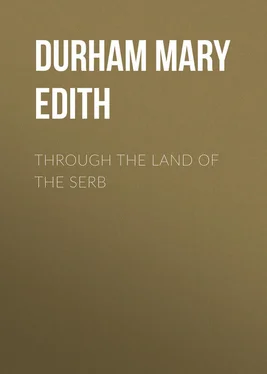Mary Durham - Through the Land of the Serb
Здесь есть возможность читать онлайн «Mary Durham - Through the Land of the Serb» — ознакомительный отрывок электронной книги совершенно бесплатно, а после прочтения отрывка купить полную версию. В некоторых случаях можно слушать аудио, скачать через торрент в формате fb2 и присутствует краткое содержание. Жанр: foreign_antique, foreign_prose, на английском языке. Описание произведения, (предисловие) а так же отзывы посетителей доступны на портале библиотеки ЛибКат.
- Название:Through the Land of the Serb
- Автор:
- Жанр:
- Год:неизвестен
- ISBN:нет данных
- Рейтинг книги:3 / 5. Голосов: 1
-
Избранное:Добавить в избранное
- Отзывы:
-
Ваша оценка:
- 60
- 1
- 2
- 3
- 4
- 5
Through the Land of the Serb: краткое содержание, описание и аннотация
Предлагаем к чтению аннотацию, описание, краткое содержание или предисловие (зависит от того, что написал сам автор книги «Through the Land of the Serb»). Если вы не нашли необходимую информацию о книге — напишите в комментариях, мы постараемся отыскать её.
Through the Land of the Serb — читать онлайн ознакомительный отрывок
Ниже представлен текст книги, разбитый по страницам. Система сохранения места последней прочитанной страницы, позволяет с удобством читать онлайн бесплатно книгу «Through the Land of the Serb», без необходимости каждый раз заново искать на чём Вы остановились. Поставьте закладку, и сможете в любой момент перейти на страницу, на которой закончили чтение.
Интервал:
Закладка:
We sat with our girl, and made futile attempts to converse with her. It was a wild, lonely spot, and save the rough track worn by generations of pilgrims, as rugged as it was created. Great grey limestone rocks arose around us, with sturdy young trees sprouting in the crannies; a small grey snake wound its way over the sunbaked stones, and a tortoise scrambled about the grass alongside. The valley shimmered in a hot haze far below, and beyond towered the bare crags of the opposite mountains. We seemed a very long way from anywhere. Appearances were however deceptive, as a short scramble brought us to a wall, a gateway, and some buildings. The girl seemed to think we had now arrived, and we imagined that we were about to find the guest-house where French, Italian, and German were spoken. We passed through the gateway on to a long wide shelf on the mountain side, 1900 feet above the sea. Two or three very poor cottages stood at the entrance, and at the farther end a tiny church, crudely painted with a maroon dado of geometrical patterns, and three small houses all apparently shut up and uninhabited. Not a soul was to be seen. The girl went into one of the cottages and fetched a tin pot of cold water, which we all drank greedily, seeing which the cottage woman came out and supplied us with as much as we required, and gave us a bench to sit on. She was mildly concerned at our appearance, for we had sweated all through our shirts, and the girl had left a black hand-print on my back, but she spoke no word of any other language but her own, and speedily retired again to her cottage. We sat on the bench and pondered, feeling very forlorn. If this were Ostrog, as the girl assured us with vigorous nods, it was not worth the roasting scramble. We were miserably disappointed, but decided that, as we had come to see Ostrog, we would see it properly, and that, if there were any inhabitants, they had not finished the midday siesta. We squeezed into a patch of shadow and cut up the mutton and black bread with a pocket-knife; the girl gladly assisted, and ate like a wolf, bolting large chunks with great appetite. There was quite a cheery lot of brandy in the flask, and as we carefully packed up the remains of the meal, in case of a siege, we felt very much better.
Then down the wide white path from the houses came a man, an old, old man in Western garb. He tottered up, and we hailed him in all our known languages; French and Italian failed, but he responded to German, and started at once on his own autobiography. He was an old soldier, he had fought under Karageorgevich. Now he had retired here to end his days. "They" had sent him here, and "they" had made him dig his grave. It was waiting for him on the mountain side. He was very lonely, and had no one to talk to. As soon as we could stem the torrent of his remarks, we asked him about quarters for the night. "Had we an introduction from the Archimandrite at Cetinje?" "No?" Then we had better go back where we had come from, and we had better start at once, if we meant to get to Nikshitje that night. We were appalled. He repeated obstinately, "You must go, and if you take my advice, you will go at once. I can do nothing for you. They," he admitted mysteriously, "cannot bear me. It is useless for me to ask them. They can speak nothing but Servian, and you will not be able to make them understand. They would have to send for me. Moreover, they are asleep." He pointed to "their" house. We asked when "they" were likely to wake up again, and he said it would be in about an hour's time. We doubted his statements, for his air was very malevolent, so as our little maiden was already coiled up on the ground fast asleep, we thought it would be just as well to rest until "they" could be appealed to. The old gentleman "who had no one to talk to" went off and indulged in an animated conversation with the cottage woman, while we dozed under a tree. When we aroused ourselves again, not much rested, we saw the shutters of "their" house were now open, so we marched up to the front door, knocked, and awaited results tremulously.
Nothing happened; we knocked a second time, and fled down the steps. Immediately the door flew open, and there was the Archimandrite of Ostrog himself, in long black gown, crimson sash, and high velvet hat – a little old man whose thin iron-grey locks flowed on his shoulders. He came rushing down the steps and shook us by the hands, saying, "Dobar dan, dobar dan" (good-day), as heartily as though he had been expecting us and we had come at last. We said, "Dobar dan," also, with enthusiasm, and then the conversation came to an abrupt conclusion. He showed us with great ceremony into his sitting-room, and made us sit on the sofa, while he sat opposite on a chair. We felt acutely uncomfortable – not one single word of English, French, German, or Italian did the good man know. We made him understand that we had come from England, which amazed him, and that we had walked from Bogatich. Then we stuck hopelessly and helplessly, while he, undaunted, went on in his native language. It seemed as if our climb to Ostrog had failed, and that flight was all that was left for us. We got up and said "good-bye" politely. Our departure he would by no means permit. "Sjedite, sjedite!" he cried, waving us back to the sofa, and down we sat again, feeling much worse. A Montenegrin about six feet four inches in height, clad in a huge brown overcoat, answered his summoning bell, and presently returned with two glasses of cold water on a brass tray which he offered to us ceremoniously, towering over us and watching us with lofty toleration, as a big dog does a little one. He waited patiently until we had drunk every drop, collected the glasses, and silently retired from the room backwards.
A horrible silence ensued. We took out our watches and showed them to each other, in hopes that the Archimandrite would then understand that our time was really up. But no. A fearful wrestle with the language followed, and lasted till the Big-Dog Montenegrin reappeared, this time with two cups of coffee. We obediently began to consume this, and the Archimandrite, despairing of ever making us understand single-handed, instructed his servant to fetch the gentleman-who-spoke-German. Through him we were at once informed that the Archimandrite offered us hospitality for the night in the house over the way. We were much amazed, and accepted gratefully. With apologies, he then inquired if we were married, and hastened to assure us that there was no disgrace attached to the fact that we were not. We were slightly dismayed when we were told we now had the Archimandrite's gracious permission to visit the shrine, and that we were to start at once.
We were put upon the right track and left to our own devices. We had been up since five, and had only had a scrappy, unhappy doze under the tree, so we told each other we would go to sleep on the first piece of ground that was flat enough. Having zigzagged up some way through the wood, we lay down on a piece of grass, and should have been asleep in a minute had not two natives appeared, an old man and a handsome lad. They seemed much interested and concerned. I merely said it was very hot, and hoped it would be enough for them. Not a bit of it. They started an argument. I said I didn't speak the language, so they shouted to make it clearer, and kept pointing up the path. What they meant I did not know. It was evident, though, that the Handsome Lad did not mean to be trifled with. He squatted alongside of us and shouted in my ear, while the old man sat down and showed signs of staying as long as we did. So we wearily started upwards again, and the Montenegrins, delighted at having made us understand, went their way much pleased with their own cleverness. We dared not rest again, and soon reached the upper monastery of Ostrog, which was so strange and unexpected that the sight of it did away with all thoughts of fatigue at once.
Читать дальшеИнтервал:
Закладка:
Похожие книги на «Through the Land of the Serb»
Представляем Вашему вниманию похожие книги на «Through the Land of the Serb» списком для выбора. Мы отобрали схожую по названию и смыслу литературу в надежде предоставить читателям больше вариантов отыскать новые, интересные, ещё непрочитанные произведения.
Обсуждение, отзывы о книге «Through the Land of the Serb» и просто собственные мнения читателей. Оставьте ваши комментарии, напишите, что Вы думаете о произведении, его смысле или главных героях. Укажите что конкретно понравилось, а что нет, и почему Вы так считаете.












